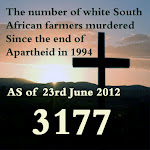by Nicholas Stix
October 12, 1998
Insight on the News
What if they had a riot and no one came? On Sept. 5 in Harlem, black Islamic radical Khalid Muhammad sought to incite a riot on the occasion of the "Million Youth March" which he organized and led. Muhammad, you may recall, is the man Minister Louis Farrakhan threw out of the Nation of Islam for being too radical. Among other directives, Muhammad told marchers, "And if you don't have a gun, every one of them [New York City cops] has one gun, two guns, three guns.... In self-defense, if they attack [postscript, November 19, 2011: try to arrest] you, take their guns from them and use their guns on them.... Don't let nobody be arrested."
A few hours later, however, it was apparent that Muhammad is not Stokely Carmichael and this was no sixties-era venue. Following Muhammad's orders, a few of the 6,000 participants did indeed attack police with steel railings. Although 15 police officers were injured (many were pelted with stones and bottles), only one marcher was arrested. Minutes after the march officially shut down, you'd never know that these same police had just averted a bloodbath. In fact, outside of New York, the march was largely a nonevent, due partly to Muhammad's inept organizing but more directly because of Mayor Rudy Giuliani's mental toughness.
In today's increasingly "wag-the-dog" style of followership, elected officials tend to take their cues from a consensus of community leaders when the smell of race war is in the air. The gospel according to Giuliani reads differently. Hizzoner, who has cross-dressed on national TV and been accused of being a closet Democrat, is the anti-Clinton. A few weeks ago, when Muhammad called for the September 5 march in Harlem and made oblique threats of a violent clash, there was no public consensus among New York's black leaders about what stance to take. Giuliani waited one week for any prominent black leader to denounce the march. When they didn't, he did.
Calling the planned gathering a "hate march," Giuliani refused to grant Muhammad and Co. a parade permit. Arguing that residential Harlem was an inappropriate venue for a 30-block parade route and potentially more than 1 million marchers, the mayor offered alternative sites and made it clear that unlawful behavior would not be tolerated.
In grave apocalyptic tones, Muhammad and his associates, Malik Zulu Shabazz and Erica Ford, promised that they would march in Harlem, "permit or no permit." They sued in federal court and got a permit. But on Sept. 1 an appeals court limited the permitted space to six Harlem blocks and the time from noon to 4 p.m.
After the mayor denounced Muhammad, Black city leaders followed suit: state comptroller Carl McCall, Harlem Rep. Charles Rangel, Manhattan Borough President C. Virginia Fields and Harlem State Assemblyman Herman "Denny" Farrel and former Rep. Floyd Flake -- Democrats all -- publicly opposed the march. Once Federal Judge Lewis Kaplan ruled in favor of the march, many of the above-named politicians prudently decided on a middle course of denouncing Muhammad and praising young people who sought to air their concerns peacefully. After the crisis was averted, Fields, along with some of the same officials, claimed that the police had overreacted, and had even provoked the violence. No surprise here: They were once again railing against Mr. Law and Order, whose hard-nosed police policies are perceived by many black New Yorkers as thinly veiled racism.
Since getting elected mayor in a city with a 5-1 ratio of Democratic to Republican voters, former U.S. attorney Giuliani has taken on a host of seemingly intractable issues -- violent crime, welfare, higher education, quality-of-life violations (such as subway-fare cheats) -- and given New Yorkers their best sense of hope since Mayor John Lindsay's welfare revolution nearly 30 years ago. Every step of the way Giuliani has made enemies. His critics -- black and white -- routinely compare him to Hitler. He seems to accept such enmity as the cost of doing business, and at times to revel in it. In contrast, Giuliani's socialist predecessor, David N. Dinkins, was elected as a "racial healer," and assiduously avoided confrontations. Yet, oddly enough, the Dinkins administration was plagued by violent, racist "boycotts," murderous pogroms, and drug-dealer-led riots.
What Dinkins and so many other urban leaders since the sixties have failed to understand is that the threat of a riot requires a swift, authoritarian response. Order must be maintained, whether in the streets of Harlem, in the ticket line at a rock concert or at the entrance to an overcrowded toy store on Christmas Eve.
Hizzoner was the clear winner of the showdown on Sept. 5, but so also were New York's black leaders, the people of Harlem -- and especially the young people who elected not to show up.
Nicholas Stix is a New York journalist who specializes in urban and educational issues.
Subscribe to:
Post Comments (Atom)

No comments:
Post a Comment